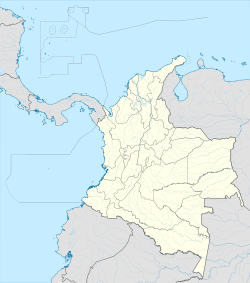Amalfi | |
|---|---|
Municipality and town | |
 | |
 Location of the municipality and town of Amalfi in the Antioquia Department of Colombia | |
| Coordinates: 6°55′N 75°05′W / 6.917°N 75.083°W | |
| Country | |
| Department | |
| Subregion | Northeastern |
| Area | |
| • Total | 1,210 km2 (470 sq mi) |
| Population (2015) | |
| • Total | 22,088 |
| • Density | 18/km2 (47/sq mi) |
| Time zone | UTC-5 (Colombia Standard Time) |
Amalfi is a town and municipality of the Colombian Andes, northern part of the Central Mountain Range in the Antioquia Department and part of the subregion of Northeastern Antioquia. The territory of Amalfi is bordered by the municipalities of Anorí and Segovia at its north; Segovia, Remedios and Vegachí at the east; Vegachí, Yalí, Yolombó and Gómez Plata at the south and Anorí and Guadalupe at the west. The town is served by Amalfi Airport.
It has an extension of 91 miles squares, being one of the biggest Antioquean municipalities in extension with a population of 22,088 inhabitants as of 2015.[1] The county seat has a population of 11,481 inhabitants[2] and it is located in La Víbora Valley, on a mountainous region that is rich in gold and water reserves, attracting settlers since the half of the 19th century from other Antioquean regions, especially Copacabana, Rionegro, La Ceja, Santa Fe de Antioquia, Yarumal and Santa Rosa de Osos, as well as migrants from countries such as Spain, Syria, Liban, Morocco, China, Germany, Sweden, Finland and West African regions like Nigeria. A permanent affluent of outside settlers during the 19th and 20th centuries searching for gold, absorbed the native population from whom there are archeological evidences dated about 9 thousand years ago that belong to the cultures of the Yamesíes, Guamocoes and Tahamíes. Their extinct language is alive in local expressions and geographical names in their interaction with European and African descendants.
The municipality is identified with the Tiger of Amafil, a historical event dated 1949, when some locals hunted a Bengal Tiger that was freed in the region. As it is also the natural habitat of the jaguar, the event became popular. The inhabitants are known as the Tigers of Amalfi.

